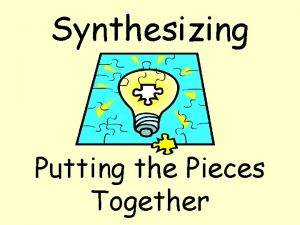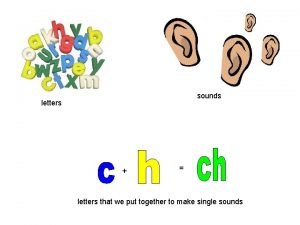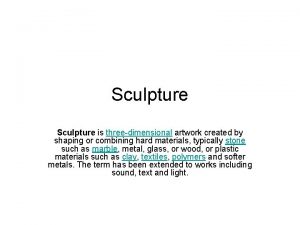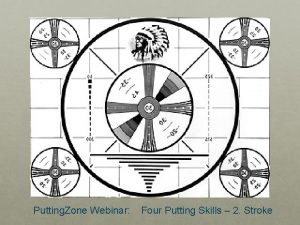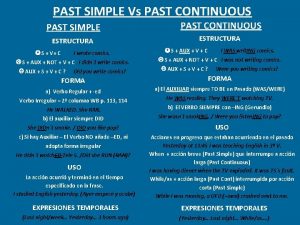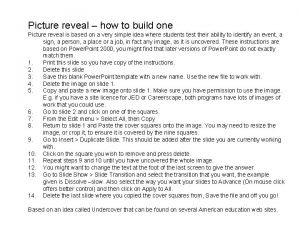Putting New Words to Work reveal reveal past



































- Slides: 35

Putting New Words to Work

reveal

reveal (past re·vealed, past participle re·vealed, present participle re·veal·ing, 3 rd person present singular re·veals) vt 1. make something known: to disclose something that was unknown or secret 2. expose something: to make something visible that had been hidden or covered 3. RELIGION make known divine truth: to make something known by divine or supernatural means

perspire

perspire (past per·spired, past participle per·spired, present participle per·spir·ing, 3 rd person present singular per·spires) vti secrete sweat: to secrete fluid from the sweat glands through the pores of the skin

anticipate

anticipate (past an·tic·i·pat·ed, past participle an·tic·i·pat·ed, present participle an·tic·i·pat·ing, 3 rd person present singular an·tic·i·pates) vt 1. act beforehand to address something imminent: to imagine or consider something before it happens and make any necessary preparations or changes 2. expect something: to think or be fairly sure that a certain thing will happen or come 3. look forward to something: to feel excited, hopeful, or eager about something that is going to happen 4. prevent something: to imagine or consider something that might happen and take action to prevent it 5. start something ahead of time: to say or do something before it becomes fashionable or comes into widespread use (formal) 6. use something not yet received: to make use of something before it has actually been received (formal)

core

core 1. central part of fruit: the fibrous central part of some kinds of fruit, containing the seeds 2. essential part: the central or most important part of something 3. GEOLOGY center of Earth: the central part of the Earth, or the corresponding part of another celestial body. The Earth’s core is molten in parts and is composed of an alloy of iron and nickel.

relegate

relegate (past rel·e·gat·ed, past participle rel·e·gat·ed, present participle rel·e·gat·ing, 3 rd person present singular rel·e·gates) vt 1. demote somebody or something: to move somebody or something to a less important position, category, or status 2. hand something on: to pass something on to somebody for the person to deal with it or provide information about it (formal) 3. exile somebody: to banish somebody from a country or community

kernel

kernel (plural ker·nels) n 1. PLANTS edible core: the edible content of a nut or fruit stone 2. PLANTS cereal grain: the grain of a cereal that contains a seed and husk 3. central part: the central or most important part of something a kernel of self-belief that never wavered 4. PHYSICS atom stripped of its electrons: a positively charged atomic nucleus that has lost its valence electrons

nocturnal

nocturnal adj 1. at night: occurring at night, as opposed to during the day 2. ZOOLOGY active at night: used to describe animals that are active at night rather than during the day 3. BOTANY flowering at night: used to describe flowers that open at night and close during the day

aardvark

aardvark

prey

prey plural prey or preys) n 1. animals hunted by other animals: an animal or animals that are caught, killed, and eaten by another animal as food The common shrew’s prey consists largely of earthworms and woodlice. 2. somebody treated unkindly by others: somebody who is attacked or receives cruel or unfair treatment from somebody else a young heiress who became prey to fortune hunters 3. killing of other animals as food: the natural practice or habit of predatory animals to hunt, kill, and eat other animals a bird of prey 4. plunder: items stolen or plundered (archaic or literary)

theatrical

theatrical adj 1. THEATER relating to theater: relating to or typical of theater or dramatic performance 2. marked by artificial emotion: full of exaggerated or false emotion

merry

merry (comparative mer·ri·er, superlative mer·ri·est) adj 1. lively and cheerful: full of or showing lively cheerfulness or enjoyment a merry laugh 2. delightful: tending to produce cheerfulness or happiness in people (archaic) the merry month of May

root

root n (plural roots) 1. BOTANY underground base of a plant: the part of a plant that has no leaves or buds and usually spreads underground, anchoring the plant and absorbing water and nutrients from the soil 2. BOTANY underground stem of a plant: an underground plant part that behaves like a root, for example, a rhizome or tuber, especially a fleshy edible one such as that of a carrot or turnip 3. ANATOMY embedded body part: the portion of a body part such as a tooth or hair that is embedded in tissue

root 4. base of something: the bottom or base of something, or the part by which something is attached to the body the root of the tongue 5. cause: the fundamental cause, basis, or essence of something, or the source from which something derives the roots of discontent 6. ancestor: an ancestor or progenitor, especially one from whom many people are descended

root 7. MATHEMATICS number multiplied by itself: a number that when multiplied by itself a given number of times equals another number 2 is the square root of 4. 8. MATHEMATICS number substitutable for a variable: a number that can take the place of the variable in an equation and solve the equation

root 9. LINGUISTICS basic part of a word: in linguistics, the basic meaningful part of a word that is left when any affixes are removed and that cannot be analyzed further into other meaningful elements 10. LINGUISTICS original form of a word: in historical linguistics, the original reconstructed form from which a recorded word is derived, for example, by phonetic change or the addition of affixes. Also called radical

root npl or roots 1. feeling of belonging: a feeling of belonging in a particular place or culture I live in the city but my roots are in the country. 2. somebody’s genetic origin: somebody’s origins or ancestry

diligence

diligence n 1. persistent effort: persistent and hardworking effort in doing something 2. legal carefulness: the care or attention expected by the law in doing something, such as fulfilling the terms of a contract

obtuse

obtuse adj 1. slow to understand: slow to understand or perceive something 2. MATHEMATICS between 90º and 180º: used to describe an angle greater than 90º and less than 180º

adhesive

adhesive n (plural ad·he·sives) glue: a substance used to stick things together adj sticky: able to stick to something or to stick things together
 Putting on the new man
Putting on the new man Putting two words together
Putting two words together Reveal past participle
Reveal past participle Putting-out system
Putting-out system What is nasreen putting chocolate on?
What is nasreen putting chocolate on? Putting-out system
Putting-out system Putting-out system
Putting-out system Putting all the pieces together
Putting all the pieces together The pricing tripod
The pricing tripod Putting objects in perspective
Putting objects in perspective Putting evidence into nursing practice
Putting evidence into nursing practice The order of putting on ppe
The order of putting on ppe Putting it all together motion answer key
Putting it all together motion answer key Putting fractions in order
Putting fractions in order Putting people first 2007
Putting people first 2007 Putting-out system
Putting-out system Putting polynomials in standard form
Putting polynomials in standard form Putting the enterprise into the enterprise system
Putting the enterprise into the enterprise system Putting letters together
Putting letters together Sculpture is created by shaping or combining the materials
Sculpture is created by shaping or combining the materials Putting zone
Putting zone Put to death the old man
Put to death the old man Enterprise
Enterprise Shoulder width stance
Shoulder width stance Package mypackage; class first { /* class body */ }
Package mypackage; class first { /* class body */ } Strategic order of main points
Strategic order of main points Practice: putting it all together
Practice: putting it all together Putting it into practice
Putting it into practice Putting prevention into practice
Putting prevention into practice Example of bridge in introduction
Example of bridge in introduction Putting it all together
Putting it all together Project evaluation and control
Project evaluation and control Coherent curriculum
Coherent curriculum Putting the pieces together case study answer key
Putting the pieces together case study answer key Putting things together is called
Putting things together is called Simple past and past progressive exercises
Simple past and past progressive exercises







